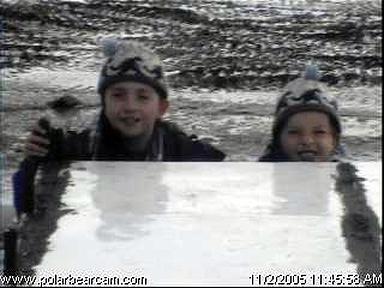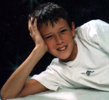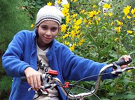Are We Thankful Enough?
I'm sitting in the D-clinic at St. Jude's, the solid tumor clinic waiting room, watching Steven play Backyard Baseball on the computer.
A little girl, 18 months old with that beautiful smooth baldness that comes from chemo toddles by. She starts to lose her balance, bangs her head lightly on a pole, regains her balance and runs off.
Her grandmother is seated next to me, she tells me that her balance has been off since radiation. She has an atypical teratoid rhabdoid tumor (ATRT), which was diagnosed when she was 3 months old.
We chat. It turns out the little girl is in the same trial as Steven, under the same doctor (Dr. Gajjar), but because of her age, she has not received whole-brain and spinal radiation, she has gotten focused radiation only.
She is due to start her first cycle of the high-dose chemo/stem cell rescue portion of her treatment later that day, the same chemo that Steven will be receiving after Christmas. The grandparents flew into town to be there for the initial cycle of chemo, they are all very nervous as to how she will handle it.
The grandmother tells me she arrived in Memphis the evening before. At Target House, where her daughter and son-in-law were staying, the phone rings and she answers it. A friendly male voice asks how her granddaughter is doing. The grandmother tells him the little girl is doing well and is scheduled to begin chemo the next day. She tells him how worried they are.
The mother of the little girl is walking through the halls of Target House and is approached by the wife of the man who called. The wife is crying. The wife puts her hands on the shoulders of the little girl's mother and looks into her eyes. The wife tells her that their 10-month old son, also with an ATRT tumor and in the same trial, has suffered leptomeningeal progression (a fancy term for the tumor having spread everywhere throughout the brain), and can't begin the high dose chemo because they have sent him home to die.
The mother of the little boy asks the little girl's mother, "Are you thankful enough? I don't think you realize how lucky you are, you aren't thankful enough."
Shaken, the little girl's mother expresses her sympathy and excuses herself.
Steven is doing well right now, his attitude is incredibly positive, for that I am indescribably thankful, but overall, I don't feel thankful. As a matter of fact I know I'm not thankful enough.
I keep praying the prayer of St. Francis,
Oh Master grant that I may never seek so much to be consoled as to console
it runs in a circle in my head, such a beautiful prayer, such a beautiful sentiment, but right now its not working.
When I hear a sad story, especially a story of a child with Steven's type of tumor who has relapsed, and they are definitely out there, my stomach ties itself into knots, I feel sick, and I try to tune it out.
I can't participate in those lists and support groups I've been a part of for so long in any sort of useful manner. I ask for help but I offer none. Much of the time I can't even bring myself to write a sympathetic response, rather, I try to forget the sad stories I hear or read, to black them out of my mind when I'm in bed at night.
Many of the kids we're meeting-- I ask what they have, but I have stopped asking how they are doing. Many are not doing so well, and right now I don't want to hear that the adorable little boy with the blue mohawk who gives me a hug every day at the hospital isn't doing well. I love them all, and I pray for all of them every night, I want all of them to be healed, to somehow be all right, to return to their homes and schools and play soccer and have "normal" lives and I don't want to hear that their treatments aren't working.
The only people here we've met from California are a couple that used to live in San Diego. They've got a 3-year old girl who has been battling leukemia for 2 years now. She's received 2 bone marrow transplants, and can't have any more. Their last-ditch effort is a new chemo, but it's not working. There are also a 4 and a 5 year old in their family. They moved from San Diego because each time they returned from St. Jude's, the little girl would relapse and they would have to go back. They finally realized they needed to live near St. Jude's, so they live in Memphis now, although they miss San Diego intensely.
A mother here at Ronald McDonald House has an adorable 8-year old boy in the same trial as Steven. While we were sitting in the radiation oncology waiting room today waiting for our sons to be irradiated, she asked me what the probability was that her son's tumor would recur. I told her statistically, 20%, but that her son wasn't a statistic. With tears in her eyes, she asked me what she was supposed to do when she returned home and treatment was done-- go on as if nothing had happened?
I told her that the truth of the matter is that neither of us will ever have a worry-free day for the rest of our lives, that is if we are lucky and our sons are the ones that turn out to be long-term survivors.
70% chance of no recurrence for Steven, 80% for her son, that's a good deal in the world of brain tumors, there are so many that are worse off. But relapse or no relapse, the craniospinal radiation is practically a guarantee of cognitive deterioration in the future. Right now, these are the good times, Steven is doing well, none of Steven's new friends has died, Mr. Brain Damage hasn't come to call yet, neither has Mr. Relapse.
And maybe they never will, so why can't I feel thankful?
- Kathleen




































<< Home